International and national leaders
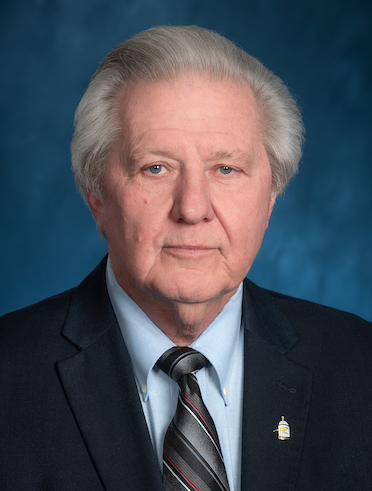
David McCall

David McCall
On Tues., Sept. 26, 2023, the USW International Executive Board appointed David McCall as the union’s new international president to fill the remainder of Tom Conway’s term.
McCall has served as USW International Vice President (Administration) since 2019. He was reelected to the post in 2021.
Previously, he served as the Director of District 1, beginning in 1998, when the International Executive Board named him to fill the remainder of the term. He was reelected as the District 1 Director from 2001 to 2017.
McCall’s career of fighting for fairness and justice, which spans decades, began in Northwest Indiana with Local 6787 at Bethlehem Steel’s sprawling Burns Harbor integrated steel facility. There, while working as a millwright, he was elected to various positions, including grievance chairman and vice president, before he joined the staff of the International Union in 1985.
He served as Sub-District Director in Gary, Ind., from 1989 until 1997, when he became Assistant to the Director of District 7.
McCall is currently Secretary of the USW Constitution Committee, and he chairs USW master contract negotiations with Cleveland-Cliffs, ATI, Goodyear and several other industry-wide bargaining committees.
From his earliest accomplishments, such as establishing the Local 6787 food bank and unemployment support committees, to representing tens of thousands of workers in negotiating and enforcing contracts, McCall has dedicated his career to improving the lives and standard of living of Steelworkers, retirees and their families.
After the crisis in American steel that resulted in 50 companies seeking bankruptcy protection between 1998 and 2002, McCall fought to restore benefits to tens of thousands of retirees who lost their insurance in federal bankruptcy court through innovative Voluntary Employees’ Beneficiary Association (VEBA) trusts. His leadership during the recent prolonged global economic recession helped enable the USW to preserve thousands of jobs with a focus on long-term viability and sustainability.
McCall graduated from the Labor Studies Program at Indiana University-Northwest in 1973 and the Harvard University Trade Union Program in Cambridge, Mass., in 1990
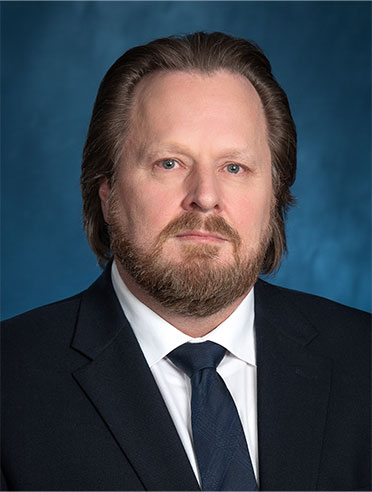
Marty Warren

Marty Warren
Marty Warren was elected as United Steelworkers National Director, as of March 1, 2022, representing the union’s more than 225,000 Canadian members. He succeeded Ken Neumann, who retired after serving as USW National Director for 18 years.
Prior to his election as National Director, Warren served as USW District 6 Director for nine years. Throughout his career, he has built a well-earned record as a consensus-builder who doesn’t shy away from tackling the daunting challenges facing the union movement, USW members and all working people.
“Canadian families are facing some of the toughest economic and social challenges we have seen in generations. Our working and living standards are under constant attack by corporations and right-wing politicians who do their bidding,” Warren says.
“Our union, and the labour movement, must fight back like never before. We will cultivate an environment that develops our next generation of activists and leaders. We will engage and empower our members, their families and all Canadians to be politically active.
“When we mobilize, we will be loud, determined and relentless in what we believe is right and just. We will work together with our political allies to push governments at all levels for change that makes life better for workers and that builds stronger communities.”
The son of a unionized ironworker, Warren has been a labour activist for three decades. He joined the United Rubber Workers (URW) in 1984 while working as a tire builder at the BFGoodrich Tire plant in his hometown of Kitchener, Ontario. Within a year, he was elected to his first local union position as a shop steward, and quickly earned a reputation as a gutsy and determined activist, leading several sit-downs and in-plant protests.
In 1991, by which time his local had grown to more than 1,000 members, Warren was elected to his first executive board position. The following year he rose to Vice-President of his local and held the position for six years. It was during this period that he also became a proud Steelworker as a result of the 1995 merger of the USW and United Rubber Workers.
Warren became president of USW Local 677 in 1998 and led the local for six years, a challenging and often turbulent period that included three labour disputes at the BFGoodrich plant. He was hired as a full-time USW Staff Representative in 2004, and in April 2012, he was appointed Assistant to the District 6 Director.
As National Director, Warren has pledged to a proactive and collaborative leadership approach to build on the USW’s unmatched legacy of defending workers’ rights and fighting for social and economic justice.
“Leadership is the challenge of bringing people and ideas together, respecting each other’s differences, and making decisions that build solidarity and encourage and support our current and future activists. It is about constant change, ensuring our union evolves, doing the hard work required to meet our members’ expectations, needs and hopes for a better future,” he says.
“It is with an overwhelming sense of responsibility for our members, our union and our communities that I have the honour to serve as the United Steelworkers National Director for Canada.”
Connect wth Marty!
Twitter: @MartyWarrenUSW
District leaders and chairs
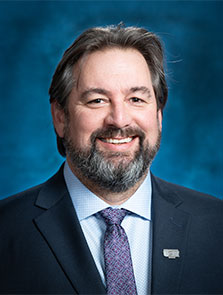
Scott Lunny

Scott Lunny
Scott Lunny is the newly elected Director of USW District 3, representing members in the largest geographic district of our international union, covering Canada’s four western provinces and its three northern territories.
After earning a degree in industrial relations from the University of British Columbia, Lunny began a career as a labour, social justice and political activist in 1994. He worked for a decade for the Industrial, Wood and Allied Workers of Canada (IWA) as a national staff representative, researcher and communications officer. He served as a senior staff and policy advisor to the president and executive officers and developed, implemented and oversaw a major organizing recruitment program, including budget and supervision of campaigns and staff.
Lunny became a proud Steelworker in 2004 when the IWA merged with the USW. He was actively involved in the planning and implementation of the historic merger. He went on to work as a USW staff representative and key staff for several years, working with the USW Wood Council on forest policy issues and coordinating numerous legislative and political campaigns.
In 2008, Lunny attended the Harvard University Trade Union Program and was appointed Assistant to the District 3 Director. For over a decade, Lunny oversaw many activities and key files on behalf of the 50,000 members in the district. He actively worked with staff and local unions on bargaining, organizing, training, political action and other member services.
Lunny was a key coordinator and was involved in negotiating the merger of the Telecommunications Workers Union (TWU) to welcome over 12,000 members to the USW. Since 2020, he has worked closely with the national local to support staff, provide mentorship and build a stronger future for the members within the United Steelworkers union.
In November 2021, Lunny was elected as District 3 Director during the USW International Executive Board election. He now serves as part of the union’s 26-member International Executive Board led by Thomas M. Conway.
As a long-time political activist and social democrat, Lunny served five years as Vice-President of the British Columbia New Democratic Party (BC NDP) and has been active with Steelworkers Vote and lobbying campaigns for the district.
He is actively involved in his community, serving as President of the Union Protein Project, a non-profit initiative created by unions and the United Way to support food banks and advocate for food security. He is also a nationally certified youth baseball coach and a long-time volunteer in local minor baseball programs.
Lunny lives in Richmond, B.C., with his spouse, Nina, and three sons, Aidan, Gavin and Owen.
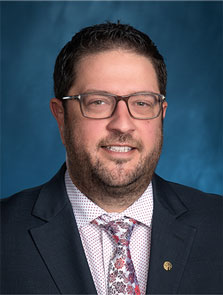
Dominic Lemieux

Dominic Lemieux
Dominic Lemieux became the USW District 5 (Quebec) Director in April 2020, and he was re-elected in 2021. He was appointed as Assistant to the District 5 Director in 2016 and before that, he worked as the USW Regional Co-ordinator for Quebec’s North Shore region.
A native of the Bas-Richelieu region of southwestern Quebec, he is the father of two children, Alexandre and Francis.
Lemieux is the vice-president of the Quebec Federation of Labour (Fédération des travailleurs et travailleuses du Québec) and a member of the board of directors of the federation’s development capital fund, the Fonds de solidarité FTQ. He is also a member of the Board of Directors of Quebec’s workplace health and safety agency, the Commission des normes, de l’équité, de la santé et de la sécurité du travail, as well as the Institut national des mines du Québec, which supports and advises the government in its responsibility for education in the mining sector.
Since 2021, Lemieux has been actively involved with a working committee for Milieux alliés contre la violence conjugale, a campaign which engages employers and unions to be allies in ending domestic violence.
Following his studies in mining, he began his career in the gold mines of Quebec’s Abitibi region, then went to work at the Stelco steel plant (now ArcelorMittal) in Contrecoeur. He quickly developed an interest in workplace health and safety and became an activist on the USW Local 6951 executive board.
Lemieux was appointed as a USW Staff Representative in 2008. He travelled throughout Quebec as a member of the union’s organizing team. He has led major negotiations with multinationals such as Rio Tinto, Alcoa, Lafarge, ArcelorMittal, Glencore and many others. He was a servicing representative for Local 9490 members at the Alma aluminum smelter who were locked out by Rio Tinto but eventually won a collective agreement that restricted the use of sub-contractors. He also was the servicing representative for one of the largest USW locals in North America, Local 8922, which represents over 16,000 private security workers across Quebec.
Lemieux holds a certificate in workplace health and safety from the University of Montreal and completed the Harvard University Trade Union Program. He earned a graduate degree in industrial relations and coaches student teams in collective bargaining competitions.
Lemieux chaired the Quebec Federation of Labour’s Youth Committee from 2007 to 2009 and played a key role in a lengthy campaign that in 2018 led to a legislated ban on two-tier pension and benefit plans in Quebec workplaces. Under his leadership, Quebec Steelworkers have led a campaign for legislative reform to better protect workers’ pensions and benefits in corporate bankruptcy proceedings.
With a passion for the art of negotiation, Lemieux is constantly seeking to advance the rights of workers, unionized and non-unionized, in workplaces and society at large, in the courts and within governments at all levels.
Recognizing that the union’s strength comes from engaged members and activists at the local level, he is committed to mobilizing grassroots members to union activism, not only during collective bargaining, but at all times, notably in the union’s political and social action campaigns in Quebec.
The USW District 5 headquarters are in Montreal.
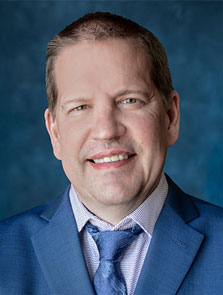
Myles Sullivan

Myles Sullivan
Myles Sullivan is the newly elected Director of United Steelworkers (USW) District 6, representing more than 74,000 USW members and 50,000 retirees across Ontario and Atlantic Canada. He previously served as Assistant to District 6 Director Marty Warren, a position he held since September 2019.
Sullivan has been a labour, political and social justice activist and, above all, a proud Steelworker, for more than a quarter-century. Born and raised in the northern Ontario gold mining community of Kirkland Lake, he joined the USW in 1995 after he was hired by mining company Falconbridge Ltd. (now Glencore) in Sudbury. He soon became active in the union, taking on roles including health and safety rep and steward before being elected chair of his 350-member bargaining unit within USW Local 2020.
Sullivan was hired as a USW Staff Representative based in Sudbury in 2007. Early in his tenure, he was the servicing staff representative for Local 6500, as members weathered their 361-day strike against Vale, working with some 3,500 families standing in solidarity against the mining giant. His direct involvement in the historic, year-long strike was a defining experience in his life and career.
“The strike highlighted the tremendous solidarity and fighting spirit of our members, who fought like hell to resist the destructive, anti-union agenda of a massive, multinational corporation. And it crystalized the necessity for the USW to continue our efforts to build community, labour and political alliances, at home and around the world,” Sullivan says. He carried many of the lessons from the strike with him as he went on to bargain major collective agreements, particularly with multinational corporations.
In 2013, Sullivan was appointed USW Area Co-ordinator for northeastern Ontario and served six years in the position before relocating to Toronto as Assistant to the District 6 Director.
An ardent proponent of member engagement and education, Sullivan credits many of his successes fighting for workers’ rights to the Steelworkers’ unmatched member-to-member education and training programs.
Throughout his career, Sullivan also has demonstrated a passion for working-class political activism. His commitment to social democratic principles includes serving nine years as a vice-president of the Ontario NDP.
Sullivan officially assumed the role of USW District 6 Director on March 1, 2022.
Past Canadian directors
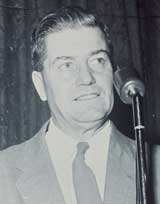
Charlie Millard

Charlie Millard
Charles Millard led fellow workers out on strike in order to win the first contract in Canada between an auto manufacturer and its workers in 1937. The CIO recognised Millard’s talent for organising, and appointed him to be the first head of the Steel Workers Organising Committee (SWOC). At the founding convention of the United Steelworkers, Millard was named the first Canadian National Director. He later served as an elected Member of Provincial Parliament in Ontario and was a founding member of the New Democratic Party.
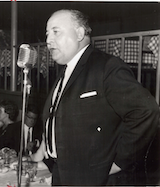
Bill Mahoney

Bill Mahoney
Bill Mahoney worked at the Algoma Steel plant, where he led the then independent union to join the SWOC. During his tenure, tens of thousands of workers joined the Steelworkers in factories across the county. Beyond organising, Mahoney is regarded as an early fighter for Canada’s universal health care system. He helped set up a non-profit health clinic in Sault Ste. Marie – a radical idea at the time. Mahoney later became the first labour leader to be named a member of a board of a university and won the Order of Canada.
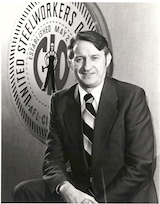
Gérard Docquier

Gérard Docquier
Gerard Docquier became the first francophone elected Director. Docquier joined the Steelworkers while working at Pirelli Cable and became a Staff Representative in the 1950s. His groundbreaking “Back to the Locals” education program energised a new generation of union members. Docquier fought against the manufacturing crisis of the 1980s, spearheading the creation of the Canadian Steel Trade and Employment Congress (CSTEC), which brought together members of the United Steelworkers and steel companies. A champion for international solidarity, he is a founding member of the Steelworkers Humanity Fund, and made the union a more inclusive space with his “Everyone’s Union” policy. Docquier was awarded the Order of Canada in 1991.
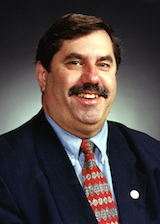
Leo W. Gerard

Leo W. Gerard
Leo W. Gerard is the son of a miner and went to work himself in a smelter in Sudbury at the age of 18, while a university student. While his tenure as Canadian Director was short, Gerard’s influence on the global union movement is unprecedented. Following his term as USW National Director, he became the international union’s Secretary-Treasurer. In 2001 he ascended to the union’s top role, and served as USW International President for 18 years, retiring in 2019. Gerard led the creation of worldwide networks of unions to build solidarity and bargaining strength among workers at multinational companies. He also led the labour movement in holding corporations accountable, filing trade sanctions against foreign companies who skirted the rules. The New York Times called Gerard the “No. 1 scourge of free traders.” Gerard received an honorary doctorate of law degrees from the University of Guelph and Laurentian University in recognition of his contributions to social justice.
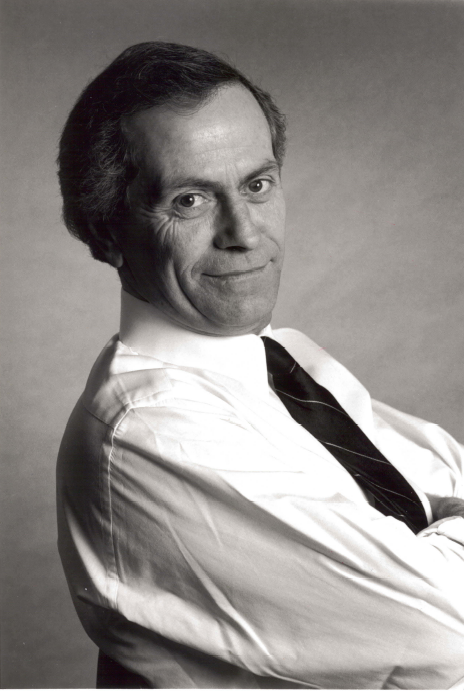
Lawrence McBrearty

Lawrence McBrearty
Lawrence McBrearty worked as a miner in Murdochville and was elected to be a local union President at the age of 28. A champion against globalization andneo-liberalism, McBrearty led the fight to amend the Canadian criminal code so that boards of directors, owners and operators could be held criminally responsible for workplace injuries or fatalities. The historic act was adopted by Parliament in 2003 and is named the Westray Law, in memory of the 26 miners who lost their lives in a preventable explosion. After his tenure as Director, Lawrence served as a board member of many steel industry associations and he was awarded a Ph.D. degree Honoris Causa from l’Université du Québec in 2004.
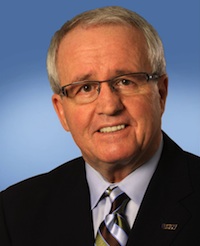
Ken Neumann

Ken Neumann
Ken Neumann served as the USW National Director for Canada from 2004 to 2022, being reconfirmed in the role in the 2005, 2009, 2012, 2014 and 2017 international elections. Born and raised in rural Saskatchewan, Ken was a teenager when he first joined the USW, at Local 5890 in Regina, Sask., and then later Local 4728. He was hired as a staff representative in 1977, elected District 3 Director in 1989, and won every subsequent district election until his appointment as National Director in 2004. Ken had an instrumental role in the USW merger with the Industrial, Wood and Allied Workers of Canada in 2004. Under Ken’s leadership, the union has signed strategic alliances with ACTRA National (the Alliance of Canadian Television and Radio Artists), the Canadian Region of Communications Workers of Canada, Environmental Defence, the Telecommunications Workers Union, Unite Here, the Canadian Football League Players’ Association and the Ontario Taxi Workers Union, as well as creating many international alliances, such as Workers Uniting – with Unite the Union in the U.K. and Ireland, and Mexico’s Los Mineros.
One of Neumann’s passions has been fighting for the dignity and independence of injured and disabled workers. He is co-chair of the National Institute for Disability Management and Research and he helped develop Pacific Coast University for Workplace Health Sciences, the first university of its kind.

